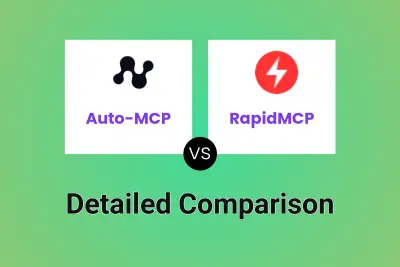 Auto-MCP
VS
Auto-MCP
VS
 RapidMCP
RapidMCP
Auto-MCP
Auto-MCP provides a streamlined solution for converting existing AI agents, tools, or orchestrators into functional MCP servers. This platform simplifies the deployment process, eliminating the need for complex infrastructure setup. Users can bring their own agents, make minor modifications using a provided dependency and CLI command, and then deploy them instantly by providing a GitHub repository link.Once deployed, these MCP servers facilitate multi-agent communication and can be readily integrated with popular development tools such as Cursor and Claude Desktop. Auto-MCP aims to foster a community around shared agents, with plans for a publishing feature to allow users to share and discover agents.
RapidMCP
RapidMCP is a platform designed to facilitate the integration of existing REST APIs with AI agents through the Meta-agent Communication Protocol (MCP). It allows developers to convert their APIs into MCP-ready servers within minutes, requiring zero changes to the existing backend code. By simply connecting an API, users can instantly make its endpoints available as tools for compatible AI agents.
The service provides essential tools for managing and monitoring these connections. Features include tool tracing, which offers detailed logs and visualizations of how AI agents interact with the API, and comprehensive auditing to maintain security compliance and assist with troubleshooting. RapidMCP aims to streamline the process of leveraging AI capabilities by enabling agents to interact securely and efficiently with established application interfaces.
Pricing
Auto-MCP Pricing
Auto-MCP offers Contact for Pricing pricing .
RapidMCP Pricing
RapidMCP offers Freemium pricing with plans starting from $12 per month .
Features
Auto-MCP
- Agent Conversion: Convert existing agents, tools, or orchestrators into MCP servers with minimal code changes.
- Instant Deployment: Deploy MCP servers directly from a GitHub repository link.
- MCP Server Hosting: Provides the infrastructure for running MCP servers.
- Tool Integration: Enables the use of deployed agents in tools like Cursor and Claude Desktop.
- Multi-Agent Capabilities: Facilitates communication and interaction between multiple AI agents.
RapidMCP
- Instant Transformation: Convert REST APIs to MCP servers in minutes with zero code changes.
- Tool Tracing: Track tool calls with detailed logs and visualizations for usage insights.
- Comprehensive Auditing: Maintain detailed audit trails of all API activities for security and troubleshooting.
- Dev/Prod Environments (Coming Soon): Manage isolated settings for development and production.
- Automatic YAML Spec to Tool Conversion (Coming Soon): Convert YAML API specifications into tools easily.
- GraphQL, gRPC Support (Coming Soon): Future support for GraphQL and gRPC tool invocation.
- MCP Prompts (Coming Soon): Configure prompts directly within the RapidMCP dashboard.
- MCP Resources (Coming Soon): Connect databases to AI Agents with no code changes.
- Self Hosted (Coming Soon): Option to deploy RapidMCP on own infrastructure for enhanced control.
Use Cases
Auto-MCP Use Cases
- Deploying custom AI agents for use in development environments like Cursor.
- Creating multi-agent systems for complex task automation.
- Integrating specialized AI tools into existing workflows via MCP.
- Simplifying the infrastructure setup for AI agent deployment.
RapidMCP Use Cases
- Integrating existing applications with AI agents via the MCP protocol.
- Enabling AI agents to interact with custom REST APIs.
- Monitoring and logging AI agent interactions with backend systems.
- Simplifying the development of AI-powered features using existing APIs.
- Providing secure and audited API access for AI agents.
- Rapidly prototyping AI agent integrations without backend modifications.
Uptime Monitor
Uptime Monitor
Average Uptime
100%
Average Response Time
221.52 ms
Last 30 Days
Uptime Monitor
Average Uptime
99.86%
Average Response Time
256.2 ms
Last 30 Days
Auto-MCP
RapidMCP
More Comparisons:
Didn't find tool you were looking for?
